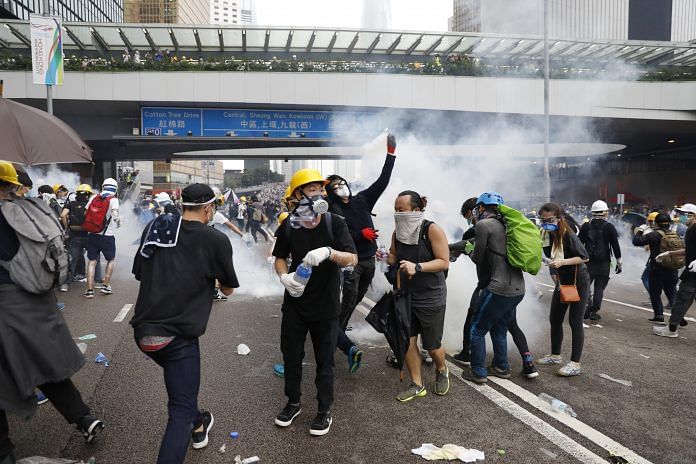New Delhi: After some of the largest protests that Hong Kong has seen in recent times, the territory’s government on Wednesday decided to postpone debates on the contentious “extradition bill”.
The proposed legislation is seen as a threat to Hong Kong’s civic freedoms and its “special status” — constraining its existing relative autonomy from the Chinese state.
ThePrint looks at what this extradition bill is all about and why has it triggered such large-scale protests.
What is the proposed extradition bill?
If approved, the proposed “Fugitive Offenders and Mutual Legal Assistance in Criminal Matters Legislation (Amendment) Bill Fugitives Bill”, as it is officially known, will allow extradition of suspects from Hong Kong to China for trial.
The amendments in the bill will also allow extradition requests made by mainland China, Taiwan and Macau for acts of wrongdoings such as murder and rape. The requests will be decided by courts in Hong Kong on a case-by-case basis but the final call will be made by the region’s chief executive — who is not elected but chosen by a Beijing-dominated election committee.
Critics fear that people may be subjected to arbitrary detention and torture under China’s judicial system.
Also, according to the Basic Law of the Hong Kong Special Administrative Region of the People’s Republic of China (which is constitution of Hong Kong), the chief executive is supposed to be “accountable” to Beijing.
Demonstrators, therefore, fear that any extradition request made by China is unlikely to be turned down by the chief executive of Hong Kong.
The bar association of Hong Kong argues that “the practical effect … is to remove restrictions against surrendering persons in Hong Kong to the rest of the PRC and … to enable the chief executive to become the sole decision-maker in concluding case-based arrangements with another jurisdiction…”
The bar association also notes that Hong Kong courts will only have a “limited role” in “reviewing and rejecting extradition processes”. The association argues that there is a fundamental incompatibility between Hong Kong and China’s judicial systems — which makes cooperation between the two nations “untenable”.
They contend that there is no transparency in China’s judicial system and point at a complete absence of legal safeguards in the Chinese justice system, especially with respect to human rights.
Also read: US, China tensions spike over Tiananmen Square massacre amid ongoing trade war
Largest protest in Hong Kong since 1997
Two massive protests were staged against the Hong Kong government. The first, held on Sunday, is believed to be the largest demonstration that Hong Kong has seen since 1997. Organisers believe over 10 lakh people took to the streets while police puts the figure at a little over two lakh.
Another set of protests took place Wednesday in which agitators blocked key roads, surrounded government buildings and threw bricks at the police. Clashes later ensued between the police and protestors, with the latter firing rubber bullets and using tear gas to control the crowd. These clashes left 72 people injured.
Following these protests, Hong Kong Chief Executive Carrie Lam decided to postpone the debate on the proposed bill. Although she later said that regardless of the protests, the government will go ahead with the bill and called the protests “organised riots”.
Extradition bill an attack on Hong Kong’s autonomy
After Hong Kong, a British colony until 1997, was handed over to China, the concept of “one country, two systems” was adopted. It ensured that for the next 50 years, Hong Kong enjoyed relative autonomy from the mainland Chinese government, except in the areas of defence and foreign policy. Hong Kong, therefore, has a different judicial system, a formal border with mainland China and its own currency.
Having freedom of assembly and right to free speech, Hong Kong has also become a symbol for civic freedoms. Dissidents of Beijing would often escape to Hong Kong and critique the government of mainland China.
The region houses regional headquarters of several multinational firms and has developed as a major global aviation hub.
The fact that Chinese authorities could arrest anyone who sets foot in Hong Kong could potentially endanger its status as a multinational and aviation hub.
Now with no extradition treaty between China and Hong Kong, critics feel this extradition bill could be misused by Beijing to arrest political opponents and dissidents.
They argue that since the 2014 “Umbrella Movement”, there has been a steady decline in Hong Kong’s civic freedoms. Demonstrators also lament that while the “one country, two systems” concept continues, there has been attempts to render this meaningless. They see the new extradition bill as another of Beijing’s efforts to curb civic freedoms in Hong Kong.
Also read: From India to Israel, laws are chipping away at democracy around the world



